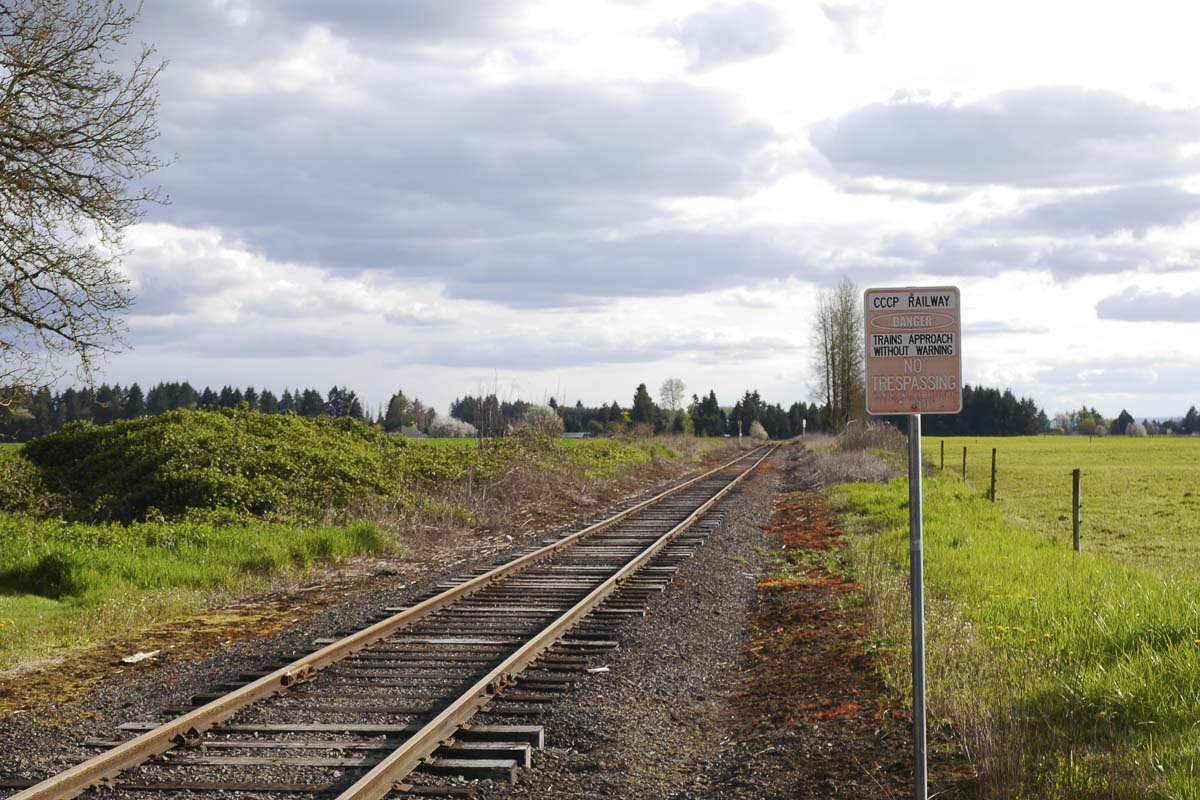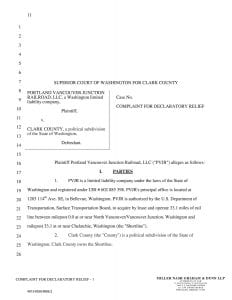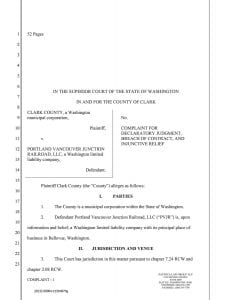Portland-Vancouver Junction Railroad and Clark County each filed suits regarding a 2004 lease agreement to operate the county-owned shortline
CLARK COUNTY — While Eric Temple can’t say exactly what happened during a mediation meeting with the county last Monday, he can sum it up this way.

“As they say, ‘a picture is worth a thousand words.’ I would say a lawsuit is worth at least a thousand as well,” Temple said Friday.
That lawsuit, filed this morning in Clark County Superior Court, accuses the county of trying to leverage Temple and Portland-Vancouver Junction Railroad (PVJR) out of their lease to operate the 33-mile Chelatchie Prairie shortline railroad, which is owned by the county.
But Temple isn’t alone in his lawsuit. The county filed their own countersuit today, alleging that the lease agreement with PVJR, formerly Columbia Basin Railroad Company (CBRR), is either no longer valid, or has never been valid.
When asked to react to the county’s countersuit, Temple said he wasn’t even aware it had been filed.
For more on the history of the Chelatchie Prairie line, the county’s ownership of it, and the agreement to lease out operations, see our earlier story here:
Chelatchie Prairie rail operator says county trying to force him out

The legal trouble, it seems, goes back to August of last year when the county began a review of the 2004 lease agreement with PVJR. That review was reportedly prompted by inquiries from an attorney representing the environmental advocacy group Friends of Clark County. Last December, attorneys for the county notified Temple and PVJR that they believed the lease was, in fact, invalid.
“We have, for months, asked them to retract those statements and admit the obvious that, in fact, the lease is legal,” Temple told ClarkCountyToday.com. “Their failure to do so puts us in a bind.”

Temple showed us a letter he received from a business interested in developing along the part of the line the county is considering for a Freight Rail Dependent Use zoning overlay. That letter, he says, is proof that the county dragging their feet on that process, and now casting his lease to operate the line into question, is costing both sides a lot of money.
“Over the life of the contract, the county would’ve probably made about a billion and a half dollars,” says Temple. “And now I’m going to sue them for well over a hundred million dollars. And that’s a swing of right under two billion dollars in the course of nine months. That’s gotta be some sort of record for incompetence.”
The lawsuit filed by Temple on Friday does not, in fact, ask for monetary compensation. It simply requests that the court determine the lease is valid, and force Clark County to abide by it.
Things took a more public turn last December, after Temple was notified the county considered his lease invalid. He responded by suspending the popular Christmas Tree trains, run by Battle Ground, Yacolt, and Chelatchie Prairie Railroad (BYCX) which subleases the northern part of the track from PVJR.
Temple blamed the county, saying their legal opinion cast doubt on whether liability insurance purchased by BYCX was valid. Then-County Chair Marc Boldt blasted Temple and PVJR in a resolution passed by the county council, saying they were retaliating.

Ultimately, the county and PVJR reached an agreement to abide by the existing lease for at least 90 days while they tried to work things out. That mediation meeting happened last Monday.
Asked if there were any further meetings planned between the two sides, Temple simply chuckled and said, “I’ll be seeing them at (the) deposition.”
In a brief statement, along with a copy of their own lawsuit, Clark County Manager Shawn Henessee said, in part, “The Chelatchie Prairie Railroad is an important public asset that should benefit all county residents and taxpayers. The County has attempted to resolve its dispute with Portland Vancouver Junction Railroad regarding the railroad lease, but believes it is in the public’s best interest to seek court rulings regarding the future of the agreement.”
In their court filing, the county makes numerous arguments about why PVJR’s lease to run the line should be either considered invalid or else be invalidated by the courts.
The first argument is that the then-Board of County Commissioners apparently never signed the actual lease agreement. It was signed by Pete Capell, who was then the county’s director of public works, and County Prosecuting Attorney Curt Wyrick.
In his lawsuit, Temple says that assertion is untrue, and he has proof the Board of Commissioners signed the agreement.
But who signed the lease is only part of the county’s argument for why they should be able to walk away from the deal.
Another argument includes the fact that the county has never received rent from PVJR as part of their deal. The county’s lawsuit alleges this would run afoul of state laws prohibiting the gifting of government property. Under the terms of the deal, PVJR would only have to pay the county after the number of rail cars used on the line exceeds 1,000 per year or 25,000 annual passengers. PVJR says the highest number of cars the line has seen per year is 853, though the county further alleges PVJR has violated the lease terms by refusing to allow them access to their records.
Temple has argued that, while he doesn’t pay rent to operate the Chelatchie Prairie line, he has poured millions of dollars into upgrading the shortline and bringing in new businesses. He maintains that, when CBRR signed their lease agreement, the line had one of the worst safety ratings in the industry.
“Not a single other railroad was going to touch this, that’s how bad it was.”
Temple says in the 15 years PVJR has operated the line they’ve increased customer counts by 1,500 percent and helped bring in state grant money to repair and replace failing rail and railroad ties along the track. If funding is approved in this year’s legislature, Temple says improvements to the track will bring it up to the same level as the main line through the Port of Vancouver run by BNSF Railroad.
But in their countersuit, the county alleges that PVJR has failed to provide documentation of the improvements they’ve made with grant funding, or show proof of personal money spent to improve the system.
Temple has also alleged that the county has failed in its duty to maintain several bridges along the system, even going so far as to close one down in December, claiming it was near failing. The county’s lawsuit alleges that PVJR has denied county inspectors the right to look at the bridge or enact repairs, and has not responded to a request for proof of the bridge’s poor condition.
The upshot of Temple’s view of the situation is that the county sees a chance to force PVJR out before freight rail dependent development is allowed. He says that’s tantamount to the county stealing 15 years of his life, just as he is about to cash in on the gamble he took with the Chelatchie Prairie line.
Temple equates today’s legal move as “sort of the final chance that (the county will) have” to pull the ripcord on the parachute. Failing to do so, he says, would trigger a lawsuit seeking massive monetary damages.
Asked if he’s had any conversations with the current council about the state of things, Temple says they’ve been advised to not speak with him due to his threat of a lawsuit.
“Part of the reason the lawsuit has been filed is because there’s no communication between me and the council,” says Temple. “It’s sort of a self-fulfilling prophecy. The council can’t come to me and say ‘oh here, let’s work this out.'”
Temple, who doesn’t live in Clark County, says the charter has put the bureaucrats in charge, making it more difficult for elected officials to get things done.
For his part, Henessee says he can’t comment about the lawsuit, or where things are at when it comes to PVJR and the lease agreement.
“The County appreciates PVJR’s participation in mediation this week and hopes the parties can work together to efficiently and effectively address the legal questions that must be resolved,” he said in a statement.




